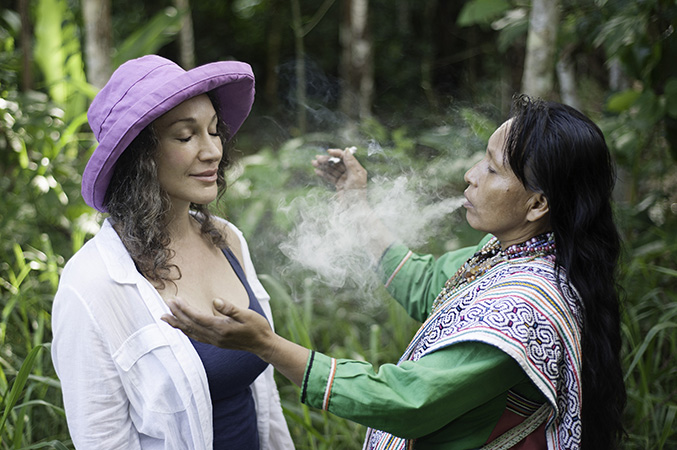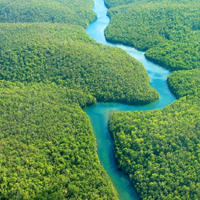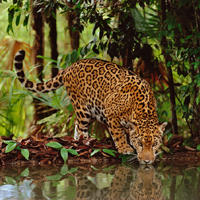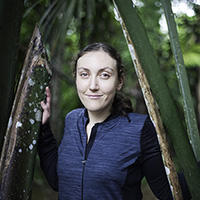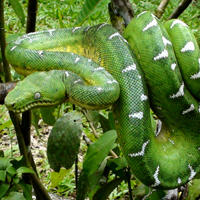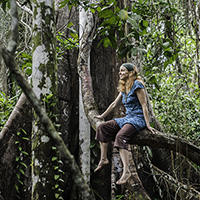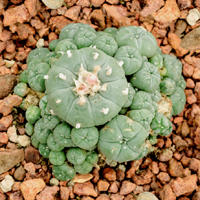Zoe Helene and Shipibo Maestro Estella Pangosa Sinacay at DreamGlade, Peruvian Amazon. Photo by Tracey Eller
We talked with Zoe Helene, the founder of Cosmic Sister, a group started as an underground network for women who have each other’s best interests at heart, women supporting women.
When the stink of impending doom is in the air, a range of options present themselves to womankind. Some meet the destructive force with resistance, others ignore it or wish it gone, and still others pour their creative and energetic passion into an intentional project that builds something more powerful, healing and lasting than the evil forces.
This last strategy is increasingly popular across domains. It can be seen in the movement toward urban farming, sustainable energy, regenerative agriculture projects, and programs to empower marginalized people. As more people acknowledge the systems of oppression perpetuated by a patriarchal society, the feminist movement deepens and expands. So, what do you get when you combine the feminist and environmental movements with Western culture’s fascination with Indigenous shamanic traditions such as ayahuasca?
Meet Cosmic Sister founder Zoe Helene, who coined the phrase Psychedelic Feminism and offers a series of grants that help promote more women’s voices in the field of psychedelics and cannabis, and that support women to experience traditional ayahuasca ceremonies in the Peruvian Amazon.
In a rapidly changing social, political, and economic climate, is this the time for people to go into the jungle and have psychedelic experiences? Does this knowledge even apply to our modern world?
For experienced journeyers, working with ayahuasca at a reputable, legal, traditional retreat can be a great way to explore the most challenging “real world” circumstances. Ayahuasca (and other psychedelic plants and fungi) can help us clarify how we can best be of service to ourselves and others in the roughest, toughest of times—without falling apart.
My last trip to Peru was between the election and inauguration, and Trump and his circus of minions did come up for me in ceremony. I got a clear message: the man is not the core issue. The core issue is: he got elected. That’s a serious wake-up call for compassionate, intelligent, informed patriots. The vast majority of people in our country are force-fed massive outputs of violent, sexist, racist, ageist, materialist junk food for the mind, body and soul, so these election results shouldn’t be a surprise. Still, I was absolutely horrified, wrangling feelings of helplessness and relative powerlessness within crisis. So, I took it up in the medicine space.
What happened?
My intention was, show me how my art—in whatever form it takes—can benefit my life and life on earth. I was very clear about my “art” being whatever medium is best for the task at hand, but I was also hoping for some clarity around painting, which I want to get back to. No matter what the ayahuasca presented to me, I kept circling back to that intention.
I got clear messages that I must find a way to create more personal and private space for myself and for close friends and family, that my husband, Chris, is the most important person in my life, and that my lively, elderly parents couldn’t be farther away from me on the planet when they spend half the year in New Zealand. I can’t help them when they need me most, and that hurts. I got an exquisite vision of the Land of the Long White Cloud from above, as if I were flying over the ocean along the earth’s arch toward a sparkling jewel of an island. I got a message that the Island is one of my spirit homes, and then, “very, very remote” and further, “about as far away as possible.”
That vision morphed into a memory of my father moving us to New Zealand in 1974 because he believed some “crazy man at the top” might start a nuclear holocaust. I watched myself, without judgment, through early childhood, learning to live as an inherently happy person who understood that someday a crazy man at the top might lose control and push the button that starts World War III. We had well-made, fully stocked nuclear bomb shelters in every home I grew up in, complete with emergency drills, diagrams and how-to-survive scenarios. From a very early age, I got that humans have the ability to destroy ourselves and everything else. With Trump’s combination of hostile-takeover and political coup, we are dangerously close to that same sort of situation again.
After that, the words “Psychedelic Feminism” were delivered as an abrupt, matter-of- fact “The End,” like in an old movie or the last page of a fairy tale. It was a flashing pink neon sign, suspended in the cosmos—a clear ayahuasca affirmation to continue on this path. At that point, my intense rollercoaster ride promptly ended.
How do the Psychedelic Feminism grants work?
We currently have three interconnected Psychedelic Feminism grants that help promote women’s voices in psychedelics, which empower women by helping us break through self-destructive cultural programming and wounds we’ve picked up by living as females in an inherently abusive male-dominated culture.
Women of the Psychedelic Renaissance and Cosmic Sisters of Cannabis grants are available throughout the year to help women develop, publish and present quality educational materials about the benefits and risks of psychedelics and cannabis. Through the Cosmic Sister Plant Spirit Grant, we take women to one of the great ayahuasca retreats in the Peruvian Amazon. Right now, we’re taking one group each year, and we already have quite a few Plant Spirit Grant finalists for 2017, including an herbal medicine teacher, a natural living educator, a cannabis and hemp advocate, a reggae singer, an anti-war artist, an ethnobotany student, a master herbalist and more. We have the—fabulous—problem of having too many qualified, inspiring applicants in a program that’s all about supporting outstanding women to be get rid of shit that keeps them from being even more outstanding. I’ve lived half a century now, and I’ve never seen anything work as deeply and rapidly as responsible, legal psychedelics. That’s why I do this work.
What other types of grants do you plan to develop?
At the top of my priority list is our Women + Wilderness + Wildlife program, which supports women’s voices in wildlife and wilderness rights. Cosmic Sister defends the rights of species such as wolves, dolphins and wild horses and essential wilderness habitats like rainforests and oceans. Most people don’t know that women are doing very important and influential work, making a big difference in saving species we might already have lost without their dedication. This year I plan to find a nonprofit organization to fiscally sponsor Cosmic Sister so we can grow this program.
The Psychedelic Feminism grants are often interconnected with wildlife and wilderness work. Ayahuasca is jungle medicine, and many people who experience it where the plant originated feel called to protect and defend the rainforest. Many have the experience of communicating with a sentient entity who challenges them to step up to the plate. I am one of those people.
When did you first see the need for Cosmic Sister?
Cosmic Sister started as an underground network for women who have each other’s best interests at heart, women supporting women. The concept was seeded when I defected from high tech into the natural products industry and conscious living movement, in response to some disappointing sexism in that scene. Even in a community that professes to seek a more enlightened way of life, males still hold the lion’s share of the power and money, so they control the conversation and the industry’s direction.
I founded Cosmic Sister to provide women in the industry a positive forum for proactively supporting each other, a sisterhood within the ethical business arena. From within the natural products industry, women of all ages shared sexist experiences with me in confidence, and almost immediately I recognized the patterns of patriarchal power abuse I experienced when I worked in the performing arts and high tech. I heard from mature women who had built successful brands with business partner husbands, and then, after the relationship ended, were bought out or forced out and rendered invisible—even if they’d contributed substantially to the brand and the greater movement. Many of these women watched their husbands marry (sometimes much) younger women. I also heard from talented young women who were sexually harassed by successful men, sometimes relentlessly, and from established women ecopreneurs who had accepted funding from men they trusted but were sexually pressured once the deal was signed and, when they refused to comply, saw their brands stolen or destroyed. I heard from respected women who were treated as trophy wives after they married high-profile men.
A good chunk of what we do at Cosmic Sister is place and develop interviews and articles about trend-setting, trail-blazing women and women-owned companies doing good work. We also recommend female expert sources to journalists and editors and encourage others to do the same. When women support other women, more women rise into their power, creating more positive change in the world.
Are all men a problem?
Of course not. There are many amazing guys in the natural products Industry (and beyond)—I don’t want to send the wrong message. I’m grateful for these men and many other guys who get it. Males are also victimized by ultimately self-destructive cultural conditioning, of course, and the type of unhealthy behavior that women have shared with me is symptomatic of that. More men are waking up to this. I’ve shared ceremony with men from around the world who are working on problems rooted in unhealthy gender programming. That’s beautiful—and very hopeful.
So, eco-feminism has always been part of Cosmic Sister?
Yes, and we did a lot at first to promote companies and individuals who support causes like animal rights and wildlife protection and lifestyle alternatives that are better for the water, air, soil and all life on earth. We expanded after I learned, through personal experience, that journeying with psychedelic “sacred” plant spirit allies can help us break through cultural programming and gain insight, new perspectives, even paradigm shifts about painful experiences we carry from the past and from mind-fuck propaganda conditioning designed to pit us against each other or hold us back. Ayahuasca can help address the endless menagerie of ideas and images that burden anyone born and raised female in a world that isn’t very friendly to females. Psychedelic plants are profound, empowering, evolutionary allies.
So, it’s a natural convergence of ecological activism, feminist theory, and psychedelic phenomena?
Cosmic Sister’s roots are in eco-feminism. It would be difficult to fit the Cosmic Sister profile and not be an eco-feminist. Many Cosmic Sisters are also Psychedelic Feminists, and where these two paths meet is our sweet spot. For those of us who hear the call to journey with plant (and fungi) allies, the experience often further deepens our connection with the natural world in profound ways.
Cultural preservation or appropriation?
This is really a question about true sustainability, which is a complex, super-sensitive issue that takes time and effort to learn about. It’s about defending the rights of indigenous people while also protecting the environment they steward, in an era when global population continues to explode exponentially, putting the Earth’s vanishing resources increasing at risk.
The Shipibo people (the tribal people with whom I have the most experience) have held onto a great deal of their art, language and plant medicine traditions, thanks in part to the keen interest in ayahuasca journeying from the outside world. They’re a remarkable people, and I’m privileged to contribute in what ways I can to the celebration, preservation and evolution of their ingenious cultural traditions.
Amazonian tribal people have survived violent tribal wars, the Spanish Inquisition and brutal British colonization. Today, they deal with aggressive extractive industry giants and the mass-infiltration of consumer pop-culture and toxic, processed packaged goods. Extractive industries still use a treacherous Colonialist manipulation technique called “debt bondage” to trick people into a type of impoverished slavery in order to gain access to irreplaceable, old-growth trees in primary rainforest on tribal lands.
Are you optimistic about the next four years?
I’m an incurable optimist and a rational realist. Trump is a dangerous, narcissistic megalomaniac, under-educated on subjects that matter most to me, oblivious and arrogant and prone to tantrums—and he’s managed to position himself at the top of the global food-chain. My message to Trump: “Earth is not your reality show.”
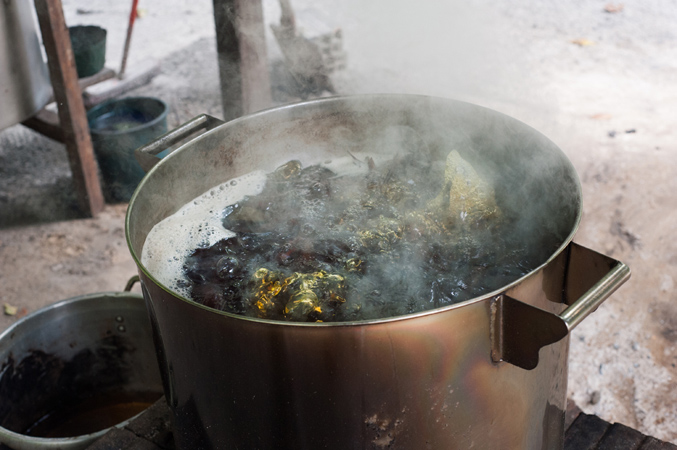
“Ayahuasca can help address the endless menagerie of ideas and images that burden anyone born and raised female in a world that isn’t very friendly to females. ” - Zoe Helene
Traditional ayahuasca brew being boiled down at Nihue Rao, Peruvian Amazon. Photo by Tracey Eller / @CosmicSister
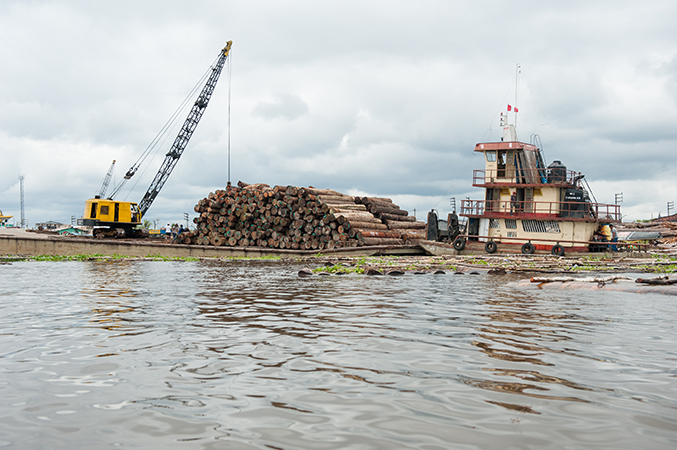
“Cosmic Sister’s roots are in eco-feminism. It would be difficult to fit the Cosmic Sister profile and not be an eco-feminist. Many Cosmic Sisters are also Psychedelic Feminists, and where these two paths meet is our sweet spot.” - Zoe Helene
Old growth rainforest timber barge on the river, Peruvian Amazon. Photo by Tracey Eller
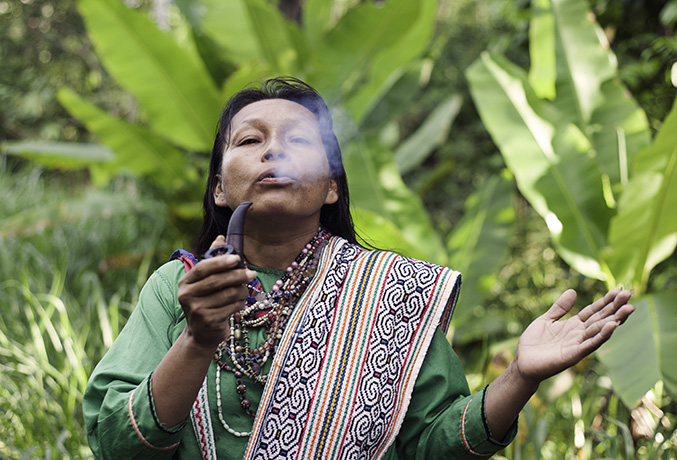
“The Plant Spirit Grant is a merit-based scholarship that helps outstanding women travel to the Peruvian Amazon to participate in authentic, traditional ayahuasca ceremonies with talented, trained, experienced indigenous healers (ayahuasceros, curanderas, shaman) who are keenly interested in sharing wisdom and bridging worlds.” - Zoe Helene
Shipibo Maestro Estella Pangosa Sinacay at DreamGlade, Peruvian Amazon. Photo by Tracey Eller / Cosmic Sister
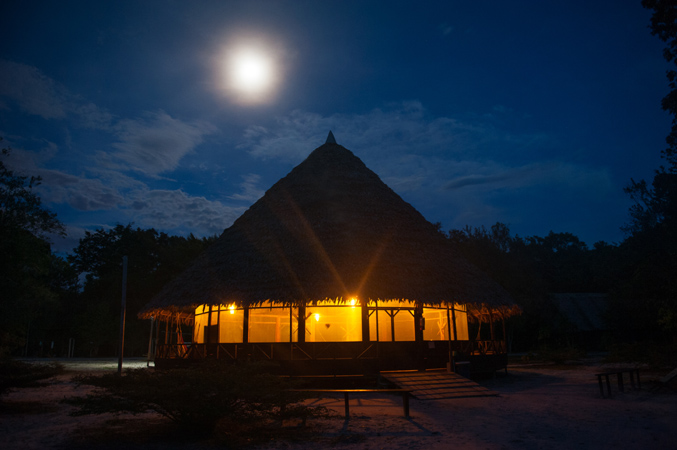
“The Shipibo people have held onto a great deal of their art, language and plant medicine traditions, thanks in part to the keen interest in ayahuasca journeying from the outside world. They’re a remarkable people, and I’m privileged to contribute in what ways I can to the celebration, preservation and evolution of their ingenious cultural traditions.” - Zoe Helene
Ayahuasca ceremonial maloca at Nihue Rao, Peruvian Amazon. Photo by Tracey Eller
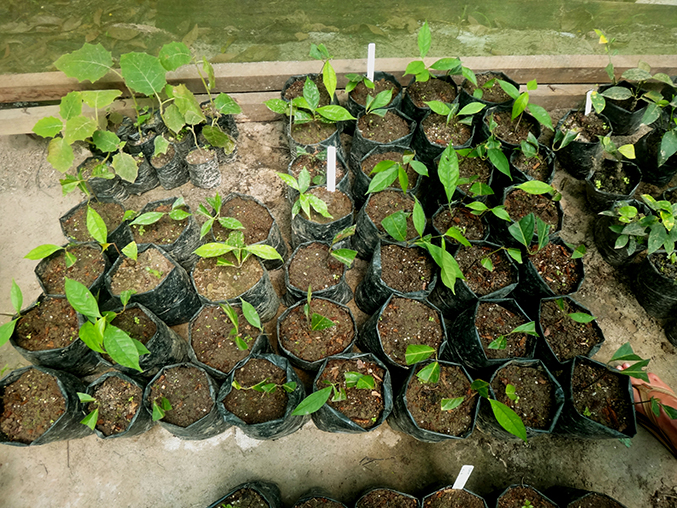
“Psychedelic plants are profound, empowering, evolutionary allies.” - Zoe Helene
Baby Chakruna in the medicinal plant nursery at Temple of the Way of Light, Peruvian Amazon. Photo by Zoe Helene
Leia Friedman, M.S.
Psychology professor and in-home therapist Leia Friedman will lead the panel discussion. Leia has just returned from Costa Rica’s Envision festival where she volunteered with the Zendo project, a harm-reduction initiative that offers help to transform difficult experiences while in a non-ordinary state of consciousness.
Friedman is expanding her skills as a professor and therapist while conducting research on the cross-cultural use of holistic interventions for the treatment of emotional, mental, and spiritual afflictions. Her present focus in psychology involves the teachings of meditation, yoga, and ecology, and the use of psychedelics to assist psychotherapy for clinical disorders. She is also involved in local social and climate justice activism, LGBTQIA+ concerns, and body positivity.
